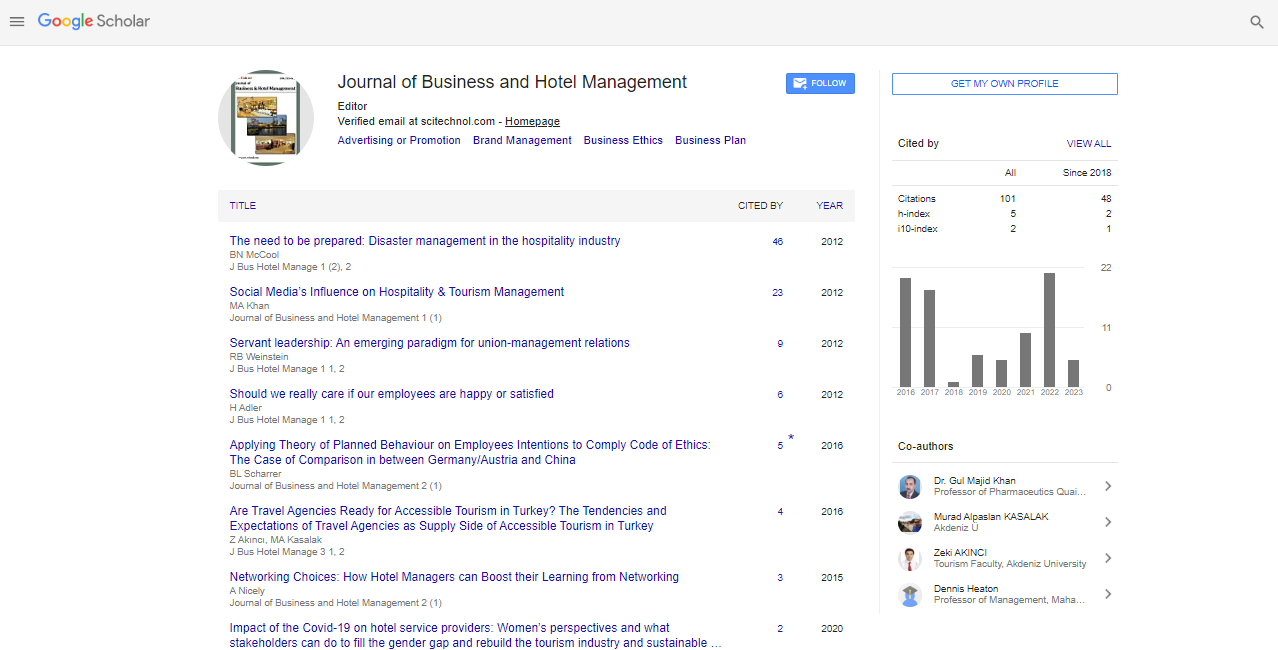Perspective, J Bhm Vol: 9 Issue: 1
Facility Management Efficiency, Sustainability and Customer Satisfaction
Sanzana Yousefli*
1Department of Management studies, Haas School of Business, University of California, Berkeley, United States of America
*Corresponding Author: Sanzana Yousefli
Department of Management studies, Haas School of Business, University of California, Berkeley, United States of America
E-mail: SanzYou@haas.berkeley.edu
Received date: 03 February, 2023, Manuscript No. JBHM-23-96110;
Editor assigned date: 07 February, 2023, PreQC No. JBHM-23-96110 (PQ);
Reviewed date: 21 February, 2023, QC No. JBHM-23-96110;
Revised date: 28 February, 2023, Manuscript No. JBHM-23-96110 (R);
Published date: 07 March, 2023, DOI: 10.4172/2324-9129.9.1.131
Citation: Yousefli S (2023) Facility Management Efficiency, Sustainability and Customer Satisfaction. J BHM 9:1.
Description
Facility management plays a vital role in ensuring the smooth operation of facilities, ranging from buildings to infrastructure and is important for the success of organizations in various industries. To thrive in today's competitive business landscape, facility managers must prioritize efficiency, sustainability and customer satisfaction.
Efficiency in facility management
Efficiency is a fundamental principle in facility management, as it impacts the operational effectiveness and cost-effectiveness of facilities. Facility managers must employ strategies to optimize operations, streamline processes and reduce waste to achieve maximum efficiency. This can involve implementing preventive maintenance programs, utilizing Computerized Maintenance Management Systems (CMMS) and leveraging data and analytics to make informed decisions. Efficient facility management also entails effective space management, resource allocation and utilization of technology to automate and streamline tasks, such as energy management systems, smart building solutions and Internet of Things (IoT) devices. By focusing on efficiency, facility managers can optimize resources, reduce costs and improve overall operational performance.
Sustainability in facility management
Sustainability has become an important consideration in facility management, as organizations increasingly prioritize environmental responsibility and social impact. Facility managers must adopt sustainable practices to minimize the environmental footprint of facilities, conserve resources and promote eco-friendly operations. This can include implementing energy-saving measures, such as Light-Emitting Diode (LED) lighting, efficient Heating, Ventilation and Air Conditioning (HVAC) systems and renewable energy sources like solar panels. Water conservation strategies, waste reduction and recycling programs and green procurement policies can also contribute to sustainability efforts. Facility managers can prioritize the use of eco-friendly materials and construction practices in building and renovation projects. By integrating sustainability into facility management practices, organizations can contribute to environmental preservation and fulfill their corporate social responsibility commitments.
Customer satisfaction in facility management
Customer satisfaction is an important aspect of facility management, as it impacts the experience of facility users, tenants and visitors. Facility managers must prioritize the needs and expectations of customers and stakeholders to ensure high levels of satisfaction. This can involve effective communication, responsive customer service and timely issue resolution. Facility managers must also prioritize safety and security measures to make a comfortable and secure environment for users. Regular facility audits, user feedback surveys and continuous improvement initiatives can help facility managers identify areas for improvement and implement changes to enhance customer satisfaction. By prioritizing customer satisfaction, facility managers can build positive relationships, attract and retain tenants and to gain a positive reputation for their facilities.
Conclusion
In today's dynamic business environment, facility management must go beyond traditional maintenance and operations and focus on efficiency, sustainability and customer satisfaction. By implementing strategies and best practices in these key areas, facility managers can drive success and to gain value for the organizations. Efficient facility management optimizes operations, reduces costs and enhances performance. Sustainability initiatives contribute to environmental preservation and fulfill corporate social responsibility commitments. Customer satisfaction efforts should always have positive relationships to improve tenant retention and build a positive reputation. By prioritizing these three aspects, facility managers can enhance the performance and sustainability of their facilities and contribute to the overall success of their organizations.
 Spanish
Spanish  Chinese
Chinese  Russian
Russian  German
German  French
French  Japanese
Japanese  Portuguese
Portuguese  Hindi
Hindi 